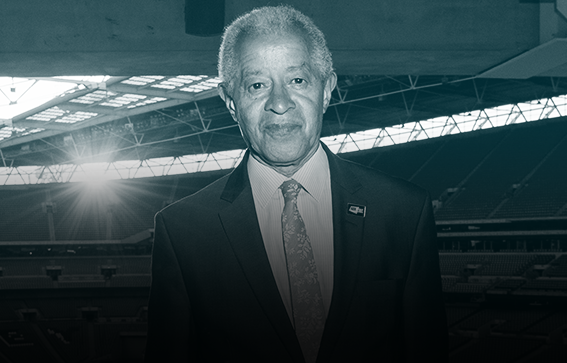In the following reflections, our Reporting Officer Cairo Duncan and Grassroots Manager Reon Stewart share how watching Uriah’s presence on the pitch during their formative years helped them see new possibilities in football, and why his legacy still drives our fight for greater representation today.
Cairo Duncan
Uriah refereed top-flight football between 1997 and 2008, so I was just four when he started and 15 when he retired, definitely my most formative years in football, and when I really fell in love with the game.
Seeing Uriah on my TV screen for the first time was a real head-turner. As a young player, I never paid much attention to referees, but Uriah stood out immediately, I was blissfully unaware that what I was witnessing was unprecedented.
It didn’t take long to understand why. Not only was Uriah like me, Black, of Jamaican heritage but he was also a genuine talent. He carried himself with confidence and a powerful aura, despite being an overwhelming minority in his field.
My most vivid memories of him are watching The Premiership (the Saturday-morning Match of the Day on ITV), the smell of my mum’s fry-up in the kitchen, and seeing a Black man as the on-field authority at the highest level. It resonated with me in a way I couldn’t articulate at the time, but it was so wholesome to witness.
I don’t recall many referees from that era, but I will never forget Uriah Rennie. Writing this, I’m reflecting on, and appreciating, his impact on me all the more and acknowledging how vital representation is, not only in football but in all walks of life.
After a 15-year wait, we now have Sam Allison and Akil Howson officiating in the top flight. I pray it won’t take so long for many more pioneers to follow. We need them, and they need us, so football must facilitate pathways for talent to flourish (shout-out to BAMREF for their great work). There’s no doubt the talent is out there; once they arrive, we must protect and support them, because they are invaluable to our under-represented communities.
Reon Stewart
A custodian of fairness, the man in the middle of the biggest league in the world naturally carries huge pressure. For you, Mr Rennie, to kick down the door and become the Premier League’s first Black male referee was truly inspirational.
The social backdrop when you took charge of more than 300 top-flight matches was far from cohesive. It came soon after the unprovoked murder of Stephen Lawrence and the investigation and trial that followed. As a teenager, I felt a deep sense of unease. Football was my outlet, and welcoming Uriah Rennie alongside the likes of Dermot Gallagher and David Elleray gave me visibility, and, more importantly, hope.
Yes, he was a trailblazer, but what affected me just as much was the consistent influence he had on top-flight games. This was an era that saw moments of ill-discipline—Paolo Di Canio’s shove on Paul Alcock, Manchester United’s wolf-pack intimidation of Andy D’Urso. Mr Rennie’s stature and presence allowed him to officiate with clear authority and command respect from household names and icons alike. Unwavering in his exchanges with players, he could also use his self-assured physicality to defuse flashpoints, the Roy Keane-Jason McAteer clash springs to mind. His determination to “let the game flow”, striding through the pitch with both arms outstretched, was refreshing to see.
Watching him work made me, for the first time, ask myself: “Could I be a ref?” I quickly answered “no”, but that was no reflection on him. His example made the game feel more inviting and showed that other roles were potentially achievable.
The path he created should have had many more followers, and I still question whether access to the elite level is truly attainable for all. The challenge for greater representation continues.
Ultimately, his impact rests on his excellence as a referee. Just as Italian referee Pierluigi Collina is iconic and universally respected, Uriah sits at that level in my world.
Mr Rennie, thank you for being visible and for carrying the mantle with poise and distinction. Your legacy will live on.


